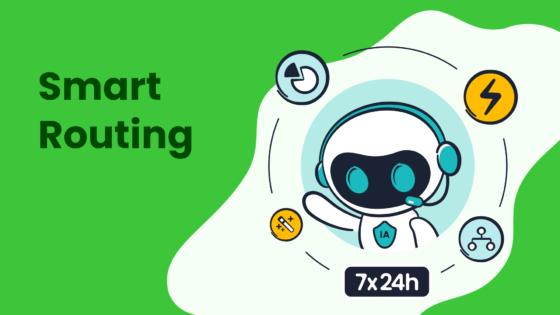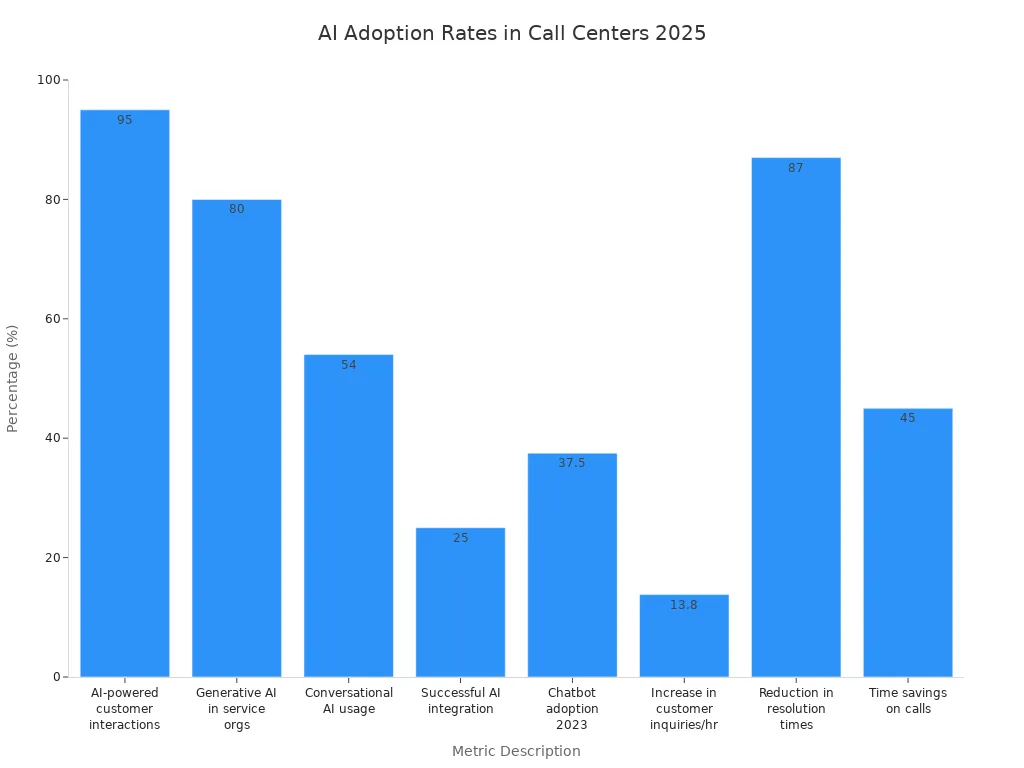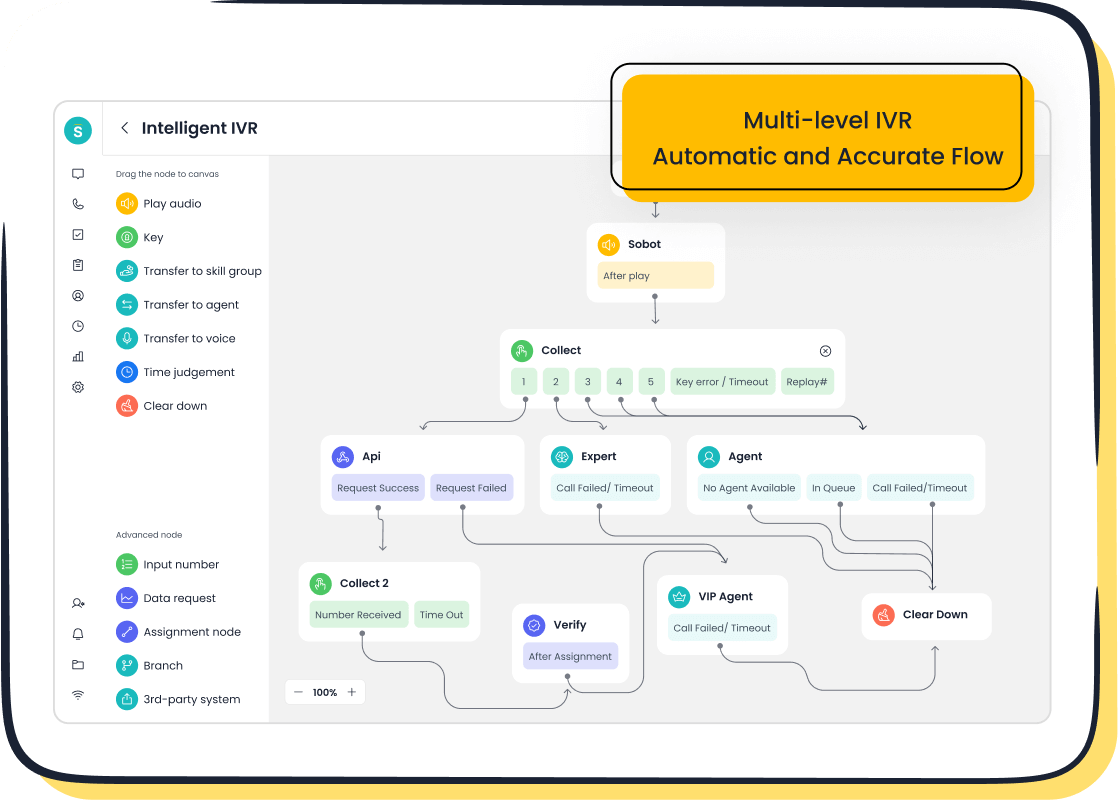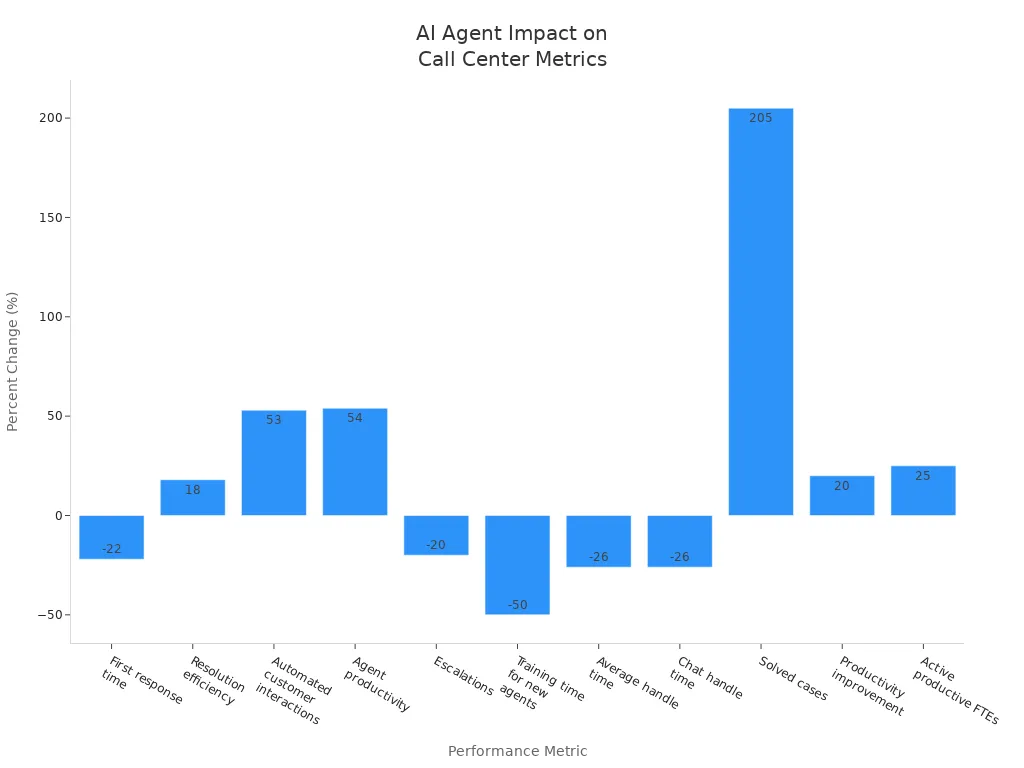Call Center Knowledge Base Innovation Fueled by AI

AI transformation shapes the future of call center knowledge base systems in 2025. Industry leaders see 56% efficiency gains, with 95% of customer interactions expected to be AI-powered. Sobot AI leads this shift, delivering ai-powered communication and automation that redefine customer service. Organizations report a 34% drop in agent overwhelm and a 25% improvement in first-contact resolution. Sobot call center innovation drives operational efficiency and customer experience, guiding the evolution toward an ai-first contact center.

AI and the Call Center Knowledge Base

Evolution of Knowledge Bases
A call center knowledge base serves as the central repository for information that agents use to resolve customer inquiries. In the past, these systems relied on static documents and manual updates. Agents searched through lengthy articles or scripts to find answers, which often led to slow response times and inconsistent service. Over the last decade, the integration of ai has driven a major transformation in how these knowledge bases operate.
Industry reports show that ai technologies have enabled virtual agents to handle complex conversations, transcribe calls in real time, and analyze sentiment. These advancements have reduced average handling times and improved first-contact resolution rates. Ai systems now manage up to 70% of routine inquiries, freeing human agents to focus on more complex customer needs. The shift from manual call handling to omnichannel ai-powered communication hubs marks a significant transformation in customer service operations.
Modern call center knowledge bases have evolved from simple rule-based systems to dynamic platforms powered by ai. Natural language processing (NLP), machine learning, and robotic process automation (RPA) allow these platforms to understand context, predict customer needs, and deliver personalized support. Ai-driven quality assurance systems analyze every customer interaction, ensuring service quality and compliance. This evolution has turned call centers into multi-channel engagement hubs that provide efficient, proactive, and personalized customer experiences.
Note: Ai transformation in call centers has led to up to 35% greater customer satisfaction and 25% cost reduction, according to industry studies.
Key AI Technologies
Ai technologies have become the backbone of modern call center knowledge bases. These tools automate routine tasks, enhance agent performance, and personalize customer interactions. The most impactful ai technologies include:
- Generative ai creates new knowledge base articles and provides instant, human-like feedback to customer inquiries.
- Ai-powered chatbots act as personal assistants, delivering immediate responses and improving customer engagement.
- Automated content tagging and classification streamline knowledge base updates, keeping information current and actionable.
- Ai analyzes customer data to personalize service and proactively address issues, improving customer experience.
- Ai-enabled pinpoint search using NLP helps agents quickly find exact answers buried deep in large documents, saving time.
- Ai-powered chatbots improve self-service by recommending relevant articles based on customer search and browsing behavior, reducing agent workload.
Modern call centers face increasing volume and complexity. Ai-powered centralized knowledge bases integrate multiple silos to provide a single source of truth. Generative ai enhances personalization and efficiency, enabling agents to deliver accurate, timely support. Real-time analytics, including sentiment analysis and predictive recommendations, guide agents to anticipate customer needs and personalize responses.
Ai-powered co-pilots provide agents with real-time suggestions and direct access to the knowledge base during live interactions. This reduces response times and improves accuracy. Ai integrates omnichannel customer data, enabling agents to maintain seamless context across voice, chat, email, and social media. Routine tasks such as FAQs, data entry, call summarization, CRM updates, tagging, and categorizing cases are automated by ai, allowing agents to focus on complex, empathetic problem-solving.
Tip: Ai continuously updates and leverages the call center knowledge base by automating post-call work, ensuring information remains current and actionable.
Sobot’s Approach
Sobot stands out in the industry with its all-in-one, integrated omnichannel platform that covers every customer touchpoint and communication channel. The company launched an "AI-First" strategy in 2024, featuring a comprehensive Five-AI system. This system includes Omnichannel AI, Scenario-based AI for e-commerce and retail, Multi-faceted AI (AI Agent, Copilot, Insight), Generative AI powered by advanced large language models, and Secure AI that ensures data privacy and compliance.
Sobot’s platform enables instant handling of complex inquiries, workflow automation, and proactive, personalized customer engagement at scale. The system supports extensive integrations with major platforms such as Amazon, Walmart, Shopify, and Salesforce, along with APIs for flexible system development. Sobot provides over 300 statistical reports with thousands of indicators, offering one of the most comprehensive analytics solutions in the industry.
Sobot’s AI-powered communication solutions include advanced features such as 24/7 automated customer service, multilingual support, intelligent knowledge base integration, no-code implementation, advanced analytics, and seamless omnichannel interactions. These capabilities enable continuous, accurate, and efficient customer engagement, improving resolution speed and customer satisfaction.
For example, Sobot’s multimodal platform integrating voice, video, and text chat led to a 35% reduction in resolution times compared to traditional voice calls. Deployment of chatbots resulted in up to 65% reduction in support operation costs while improving customer satisfaction scores. Saudi Telecom Company reduced resolution times by 60% and increased customer satisfaction by 21% through sentiment-sensitive escalation systems. Rocket Mortgage achieved a 68% customer satisfaction score by enabling ai interactions with human escalation on customer terms.
Sobot’s approach distinguishes itself by consolidating all customer channels and communication methods into one service platform, eliminating the need for multiple systems. The platform provides timely customer service access and competitive pricing, often half or less than competitors without hidden fees. Sobot’s solutions empower agents to become experience orchestrators, collaborating with ai tools that handle repetitive work while agents manage complex interactions.
Sobot’s AI-powered knowledge base solutions transform call centers into efficient, personalized, and integrated customer service hubs. Agents gain instant access to real-time suggestions, sentiment analysis, and predictive recommendations, enabling them to deliver superior customer experiences.
Personalization for Customer Experience
AI-Driven Content Delivery
AI-driven content delivery transforms customer care by providing hyper-personalized interactions at every touchpoint. AI analyzes customer data in real time, enabling agents to deliver relevant information and recommendations. This approach leads to enhanced first-call resolution rates and reduces call escalations. Customers receive consistent, high-quality care, which builds trust and loyalty. AI-driven automation supports agents with real-time coaching, emotion detection, and contextual information retrieval. These features improve customer satisfaction and agent confidence, resulting in lower attrition rates. AI-driven engagements ensure that every customer receives personalized service, increasing both CSAT and NPS scores.
AI-powered chatbots and voice assistants deliver faster response times and 24/7 availability, allowing customers to access support anytime. This proactive approach detects issues before they escalate, reducing inbound tickets and improving retention.
Dynamic Self-Service
Dynamic self-service powered by AI empowers customers to resolve issues independently. AI chatbots and virtual assistants use natural language processing to provide intuitive support. Customers benefit from instant assistance, which reduces wait times and increases satisfaction. AI automates repetitive tasks, allowing human agents to focus on complex care needs. Intelligent routing connects customers to the right agent when necessary, speeding up resolution times. This seamless blend of automation and human expertise creates hyper-personalized experiences and strengthens personalized customer relationships.
- AI self-service tools:
- Answer basic questions quickly.
- Automate workflows to minimize errors.
- Ensure always-available support for global customers.
Sobot Voice/Call Center Features

Sobot’s voice and call center solutions leverage AI to deliver personalized customer experiences across every channel. The upgraded AI Agent supports voice calling, email ticketing, and intelligent voicebots for both inbound and outbound interactions. AI-powered voicebots answer questions using the knowledge base, reducing the need for human transfers. Outbound voicebots tag customers by purchasing intention, boosting marketing effectiveness. Sobot’s Five-AI system ensures seamless engagement, combining omnichannel AI, scenario-based solutions, and secure data management. Core technologies like ASR, NLP, and LLMs enable the voicebots to resolve issues independently or escalate to human agents when needed. These features drive customer satisfaction, operational efficiency, and a new standard of care in every interaction.
Real-Time Agent Support with AI

AI Copilots and Virtual Assistants
AI copilots and virtual assistants have transformed agent workflows in call centers. These tools provide real-time feedback, helping agents deliver faster and more accurate care. Over 60% of support agents report that AI assistant tools save time, allowing them to focus on complex customer needs. AI copilots automate routine tasks, such as ticket tagging and drafting responses, which reduces cognitive load and lowers burnout risk. They also integrate with CRM systems, offering personalized care by analyzing customer history and preferences. Agents receive instant suggestions and insights, improving communication and knowledge retention. AI copilots scale support during high-volume periods, maintaining quality and consistency in customer interactions.
- AI copilots:
- Reduce response times by handling many inquiries at once.
- Provide 24/7 availability for customer care.
- Enhance personalization through advanced algorithms.
- Ensure consistent and accurate responses.
- Automate routine tasks, freeing agents for complex care.
Instant Knowledge Access
Instant access to knowledge is essential for effective customer care. AI-powered systems deliver up-to-date information, enabling agents to resolve issues quickly. Best practices include maintaining a centralized, user-friendly knowledge base and integrating AI-powered search capabilities. Agents benefit from multi-device accessibility and multimedia content, such as videos and pictorials, which help resolve simple queries faster. Generative AI dynamically creates and updates content, ensuring agents always have relevant information. Transparency and comprehensive training programs help agents use AI tools effectively. Combining AI automation with human oversight reduces errors and builds trust in customer interactions.
Note: Esure achieved a 30% reduction in average handling time by adopting AI-powered knowledge management, improving both agent efficiency and customer satisfaction.
| Company/Case Study | Metric Improved | Improvement/Impact |
|---|---|---|
| Lulu and Georgia | First response time | 22% reduction |
| Honeylove | Agent productivity | 54% increase |
| Allied Global | Productivity improvement | 20% increase |
| Tithely | Solved cases | 205% increase |
Sobot in Action
Sobot’s AI solutions empower agents with real-time feedback and instant access to knowledge. OPPO achieved an 83% chatbot resolution rate and a 57% increase in repurchase rates by using Sobot’s AI support. KFC enhanced customer care by providing personalized menu suggestions based on purchase history. Sobot’s platform combines AI automation with human expertise, ensuring agents deliver high-quality care during every customer interaction. The system supports continuous monitoring and strategic automation, leading to improved productivity and satisfaction.

Predictive Analytics and the Future of Service
Anticipating Customer Needs
Predictive analytics shapes the future of customer care by enabling call centers to anticipate customer intent and needs before they arise. AI-powered tools such as Convin and Insight7 analyze call data, customer behavior, and agent performance in real time. These platforms deliver dynamic guidance and proactive alerts, helping agents respond quickly and accurately. David Funck from Avaya notes that AI and machine learning allow call centers to personalize care, reduce friction, and optimize staffing. Unified dashboards and predictive churn modeling help teams identify at-risk customers and intervene early. Automated coaching pinpoints training needs, boosting customer satisfaction and retention. Companies using predictive analytics report measurable improvements in customer service outcomes and agent engagement.
| Tool Name | Key Features | Best For |
|---|---|---|
| Insight7 | Real-time dashboards, predictive churn modeling, CRM integration | Scaling call centers |
| Talkdesk | Predictive dialers, live sentiment analysis, workflow automation | Teams seeking integrated insights |
| Five9 Intelligent CX | Predictive routing, satisfaction scoring, AI-powered engagement | High-volume centers |
Sentiment Analysis
AI-driven sentiment analysis transforms customer care by tracking emotions and intent across every interaction. Real-time sentiment tracking enables agents to respond promptly to concerns and leverage positive feedback. Deep sentiment insights help tailor communication strategies, making customer service more empathetic and effective. AI identifies trends and recurring issues, supporting proactive improvements. Issue prioritization ensures critical problems receive immediate attention, improving team efficiency. In call centers, AI analyzes voice tone and emotion, providing agents with mood insights to adjust responses. Sentiment analysis also evaluates agent performance, guiding training and skill development. Companies benefit from improved customer satisfaction, reduced churn, and stronger brand reputation.
- AI sentiment analysis:
- Enables real-time emotion detection.
- Reduces resolution times.
- Forecasts customer churn.
- Scores interactions on emotional outcomes.
- Aligns sentiment across channels.
Proactive Solutions
AI enables proactive solutions that drive the future of customer care. Automated agents handle routine tasks, freeing teams to focus on high-impact interactions. Predictive churn modeling and loyalty management with AI-optimized offers increase customer retention. Proactive engagement through enriched data and predictive alerts leads to a 25% reduction in churn and a 30% increase in customer satisfaction. Companies see a 40% boost in Customer Lifetime Value. AI identifies at-risk customers early and personalizes retention efforts. The table below shows how AI-powered approaches outperform traditional methods in key retention metrics.
| Metric | Traditional Approach | AI-Powered Approach | Improvement |
|---|---|---|---|
| Payment Recovery Rate | 15-25% | 40-50% | 2-4x better |
| Involuntary Churn Reduction | 5-10% | 30-50% | 3-5x better |
| Customer Satisfaction | Baseline | +45% | Significant gain |
| Overall Churn Reduction | 5-15% | 25-30% | 2x better |
| ROI on Retention Investment | 2-3x | 5-7x | 2x better |
AI-powered predictive analytics and sentiment analysis set a new standard for customer care, ensuring call centers deliver proactive, personalized, and efficient customer service for the future.
AI-Powered Communication and Training
Agent Onboarding
Call centers use ai-powered onboarding tools to accelerate agent training and boost retention. These systems personalize learning modules by analyzing real-time performance data. Agents receive instant feedback on strengths and areas for improvement, which helps them build confidence quickly. Ai adapts training complexity to match each agent’s skill level, keeping them engaged and motivated. By identifying skill gaps, ai suggests targeted resources, making onboarding more efficient. Studies show that ai-driven onboarding reduces training time by 25% and lowers costs by 15%. New agents develop the skills needed to handle complex calls faster, which leads to higher retention rates and a more stable workforce.
Tip: Ai role-playing simulations allow agents to practice realistic conversations with virtual personas, providing judgment-free feedback on empathy, tone, and clarity.
Knowledge Retention
Ai coaching systems monitor and analyze every call, automating performance evaluation and reducing the burden on supervisors. These platforms score agents objectively by examining tone, pacing, and adherence to processes. Real-time feedback during calls helps agents improve communication skills and retain knowledge. Ai-powered training expands agent capacity by enabling less experienced staff to fill skill gaps effectively. Trust and transparency in the coaching process encourage adoption and maximize effectiveness. Regular measurement of accuracy and ongoing refinement, including human feedback, maintain high-quality training standards.
- Benefits of ai-powered knowledge retention:
- Consistent, objective scoring
- Real-time feedback for skill development
- Expanded agent capacity
- Improved employee engagement
Continuous Improvement
Ai drives continuous improvement by automating routine tasks and providing real-time support. Agents resolve inquiries faster and more consistently, which enhances productivity and customer satisfaction. Ai-powered analytics identify strengths and training needs, fostering a culture of ongoing learning. These systems optimize internal processes by managing workloads and preventing agent overload. Real-time issue escalation through sentiment analysis helps flag urgent cases early, improving operational efficiency. Ai-driven training personalizes learning and offers targeted modules for continuous development. Call centers use dashboards to monitor performance and refine workflows, ensuring sustained improvements.
| Metric | Before AI | After AI | Improvement |
|---|---|---|---|
| Training Time | 4 weeks | 3 weeks | 25% faster |
| Retention Rate | 70% | 85% | +15% |
| First-Call Resolution | 65% | 80% | +15% |
Ai-powered communication and training transform call center operations, creating a workforce that adapts quickly and delivers superior customer service.
Hybrid AI-Human Collaboration
Escalation to Human Agents
Hybrid AI-human collaboration has become essential in modern customer service. Automated systems handle routine queries and repetitive tasks, allowing human agents to focus on complex customer interactions. When a customer faces a unique or emotionally charged issue, the system uses real-time sentiment analysis to detect the need for escalation. The AI prepares all relevant data and context, so the human agent receives a complete background. This seamless handoff ensures the customer does not need to repeat information, leading to faster and more satisfying resolutions. For example, Sobot’s partnership with OPPO demonstrates this approach. During peak shopping periods, OPPO’s chatbot managed high volumes of basic inquiries, while human agents addressed complex care needs. This cooperation led to an 83% chatbot resolution rate and a 57% increase in repurchase rates, as detailed on Sobot’s official website.
Empathy in Service
Empathy remains a cornerstone of excellent customer care. While AI can simulate empathy and provide supportive responses, only human agents deliver the emotional depth needed for sensitive situations. Customers often prefer human interaction when facing urgent or personal issues. Empathic responses from both AI and humans help calm negative emotions and build trust. However, the human touch is irreplaceable for building long-term relationships and handling nuanced concerns. Combining AI’s efficiency with human empathy creates a customer-centric mindset that enhances every interaction.
Best Practices
To achieve the best results in customer service, organizations should:
- Assign AI to handle routine tasks, freeing agents for complex or emotional interactions.
- Train agents to use AI tools for real-time insights and information retrieval.
- Customize workflows to match business needs, ensuring the right balance between automation and human care.
- Monitor both AI and human performance to optimize processes.
- Maintain transparency about when customers interact with AI versus a human agent.
This balanced approach improves productivity, decision quality, and customer experience, while reducing agent burnout and enhancing satisfaction.
Implementing AI in Call Center Knowledge Bases
Steps to Get Started
Organizations planning for the future of customer service should follow a structured approach to ai adoption in call center knowledge bases:
- Define clear objectives, such as reducing call handling times or improving customer satisfaction.
- Start with pilot projects to test effectiveness on a small scale before expanding.
- Address integration by building flexible architectures that connect knowledge bases, CRM, and authentication systems.
- Ensure high data quality and seamless integration with existing platforms for accurate, personalized interactions.
- Train ai models using supervised and reinforcement learning tailored to business needs.
- Design natural conversational flows by involving domain experts and conversation designers.
- Keep humans in the loop for easy escalation and maintain empathy.
- Focus on user-friendly interfaces and train agents to work with ai tools.
- Prioritize continuous learning by monitoring performance and refining the system.
- Maintain transparency with customers about ai use and invest in security and compliance.
Tip: Foster a culture of innovation by engaging teams early and providing ongoing training to support the future of customer care.
Measuring Success
Success in implementing ai-powered knowledge bases depends on tracking the right metrics. The following table highlights key indicators:
| Metric | Description |
|---|---|
| First Call Resolution (FCR) | Percentage of issues resolved without follow-up; links to customer satisfaction. |
| Average Handle Time (AHT) | Total time spent per interaction; measures efficiency. |
| Knowledge Base Usage Efficiency | Tracks agent use of resources, including search patterns and article effectiveness. |
| Customer Satisfaction Score (CSAT) | Direct feedback from customers, reflecting their experience. |
| Customer Effort Score (CES) | Measures how easy it is for customers to resolve issues. |
| Sentiment Analysis Score | Real-time analysis of customer emotions during interactions. |
| Call Back Prevention Rate | Success in preventing repeat contacts through first-time resolution. |
| AI Assistant Usage Rate | Tracks how often agents use ai tools in workflows. |
| Knowledge Base Gap Analysis | Identifies missing information and content needs. |
| Knowledge Base Update Frequency | Monitors how often content is refreshed for accuracy. |
Tracking these metrics before and after implementation provides a clear view of progress and readiness for the future.
Overcoming Challenges
Organizations face several challenges when integrating ai into call center knowledge bases:
- Lack of control over knowledge infrastructure can lead to imprecise answers.
- Transparency issues may cause distrust if customers do not understand how responses are generated.
- Hallucinations, or false information, can occur without a centralized, cleansed knowledge base.
- Resistance to change and lack of internal expertise may slow adoption.
- Data privacy and compliance concerns require careful planning.
- Interoperability with legacy systems can complicate integration.
To overcome these obstacles, companies should:
- Centralize and standardize knowledge across all systems.
- Involve employees early and provide comprehensive training.
- Choose solutions with proven integration capabilities.
- Organize and cleanse data to fit future requirements.
- Roll out changes in phases and combine ai insights with human expertise.
Note: Call centers with well-structured knowledge infrastructure have reduced query resolution time by 80% and average handle time by 30%, setting a strong foundation for the future.
AI brings a transformation to the call center knowledge base, empowering agents with real-time knowledge and automating repetitive tasks. Customers now receive faster, more accurate support, and language barriers no longer limit service. Decision-makers should track key metrics, upskill teams, and centralize data to prepare for the future. Sobot’s solutions help organizations deliver customer experiences that set new standards. The future promises even greater innovation, making customer service smarter and more responsive.
FAQ
What is an AI-powered call center knowledge base?
An AI-powered call center knowledge base uses artificial intelligence to organize, update, and deliver information. Agents and customers get instant, accurate answers. This technology improves operational efficiency and customer experience.
How does Sobot improve customer experience in call centers?
Sobot uses AI to personalize every interaction. The system provides real-time suggestions and automates routine tasks. Customers receive faster support, and agents resolve issues more efficiently.
Sobot’s AI-driven platform helps companies achieve higher customer satisfaction scores and lower response times.
Can AI help reduce operational costs in call centers?
Yes. AI automates repetitive tasks, manages large volumes of inquiries, and streamlines workflows. Companies report up to 25% cost reduction and improved resource allocation.
- Example: Sobot’s AI solutions cut support operation costs by up to 65%.
How does AI ensure knowledge base accuracy?
AI continuously updates the call center knowledge base by analyzing interactions and feedback. It flags outdated content and suggests improvements.
| Feature | Benefit |
|---|---|
| Real-time update | Accurate information |
| Automated review | Fewer errors |
Is Sobot’s AI solution secure and compliant?
Sobot prioritizes data privacy and compliance. The platform uses encryption and follows global standards. Businesses trust Sobot to protect sensitive customer data and maintain regulatory compliance.
Note: Sobot’s system stability reaches 99.99%, ensuring reliable and secure operations.
See Also
Comprehensive Overview Of AI Software For Call Centers
Evaluating Advanced AI Solutions For Enterprise Call Centers
Ways AI Customer Support Software Enhances Operational Efficiency
Best Ten AI Technologies For Enterprise Contact Centers
Artificial Intelligence Agents Transform Customer Service Experience
